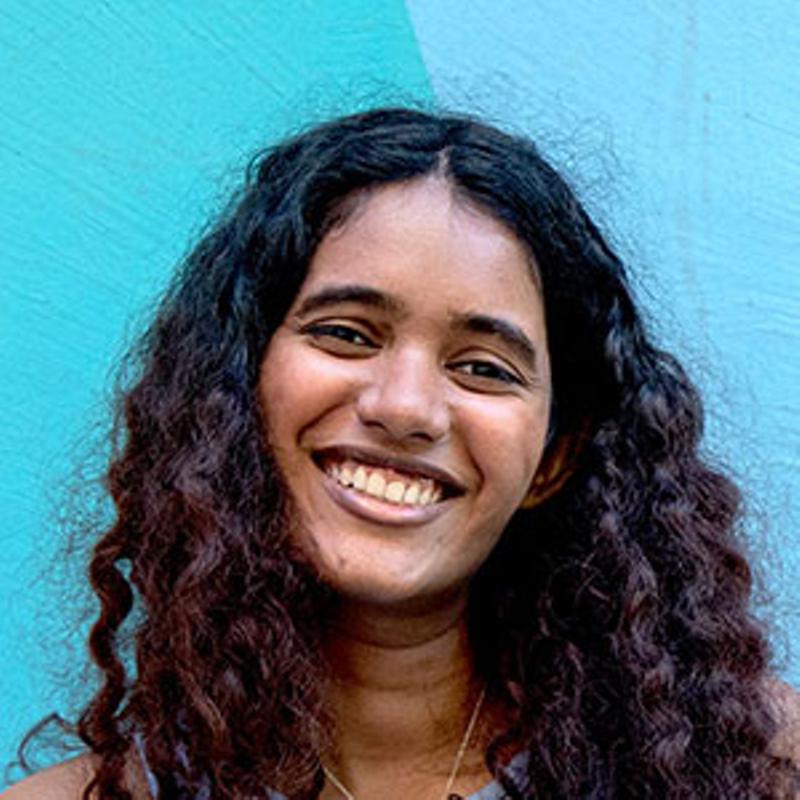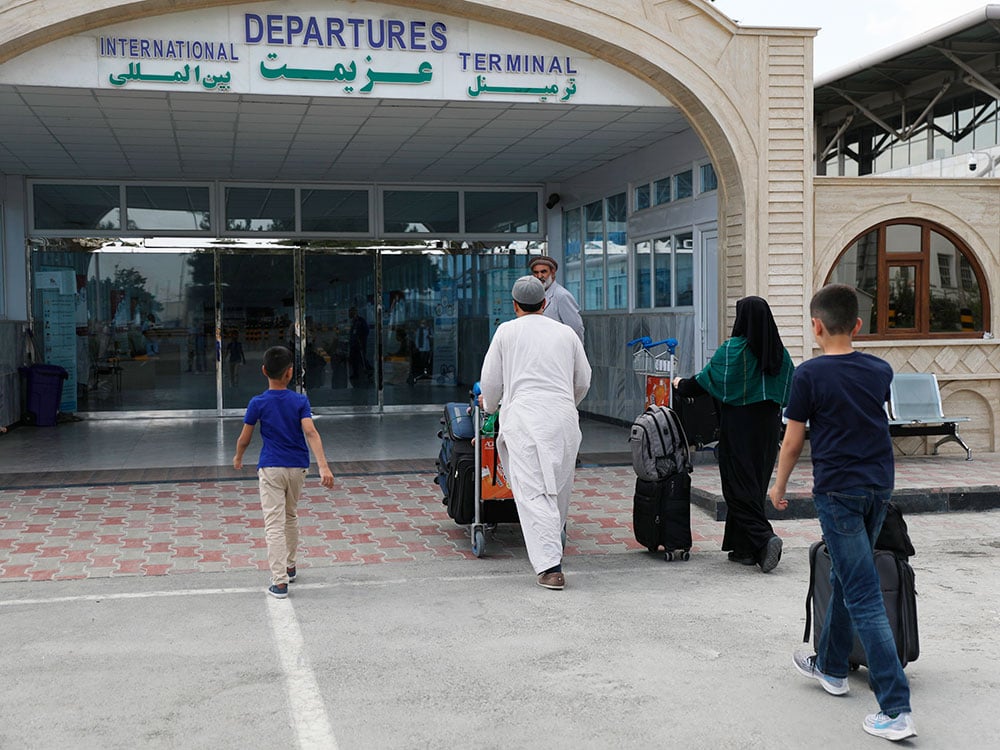“We can never go back to our country,” says journalist Khatera Ahmadi.
Ahmadi is one of 74 Afghan journalists, translators social justice activists and fixers — locals arranged to liaison with foreign journalists to facilitate reporting — waiting to get the go-ahead to move to Canada after fleeing for temporary sanctuary in countries such as Pakistan.
“Afghanistan is a dangerous country for women, human rights activists and female journalists,” Ahmadi told The Tyee in an email interview.
After the Taliban regained power last fall, reports described violence, killings and death threats against people considered enemies of the new government.
For many Afghans, this meant an immediate need to flee the country.
Journalists for Human Rights, based in Toronto, quickly launched an emergency evacuation effort, working with similar organizations in other countries.
“When Kabul fell, I'd had discussions with Kiran Nazish, who's the head of the Coalition for Women in Journalism. She had reached out and said, ‘This is looking really bad. And it looks like we're going to have to evacuate almost an entire sector of journalists,’” said Rachel Pulfer, JHR’s executive director.
JHR wasn’t active in Afghanistan at the time. But its previous evacuation efforts in combat zones across the world had prepared it for the challenges.
“It's important to have access to security professionals and other kinds of logistical and operational pieces,” Pulfer said. “It's also important to understand what a war economy is like. You often need a large amount of cash and very shortly.”
At the beginning of the effort, charter flights were used to help people flee. But a deadly bombing on Aug, 26, 2021, at Kabul’s airport meant flights were a security risk. So referral networks and land routes were explored to build safe passage. Organizations like Rainbow Railroad and Afghan Women’s Organization became pivotal pieces in this puzzle.
By October, Journalists for Human Rights and partner organizations helped 153 Afghan journalists, fixers, translators and activists flee the country. Additionally, Canadian veterans' groups worked to evacuate people who had assisted the Canadian Armed Forces.
Today, 171 journalists, fixers, translators and activists have found new homes in Canada and 84 have found homes in other countries such as France, Germany, Australia and New Zealand.
But a remaining 74 — though they’ve secured visas — are still waiting to travel to Canada from host countries like Pakistan. Bureaucratic issues like flight cancellations and wait times for exit permits have delayed this resettlement.
From the Journalists for Human Rights’ original list of 500 of journalists, fixers, translators and activists who required evacuation, 400 have been relocated. About 100 people are waiting for passports from the new Afghan government, approximately 24 don’t have a pathway out of the country and another 500 were placed on a reserve list for rescue.
Journalists for Human Rights raised $1 million from corporations and individual donors to help fund the rescue effort. Canadian corporations like TD Bank Group and RBC, as well as Google and Meta, contributed.
“I was so impressed with the incredible desire to help,” said Pulfer, citing union partner Unifor and the International Federation of Journalists as particularly strong partners in the rescue and fundraising efforts.
In addition to helping organize the evacuation efforts, the federal government also provided funding to JHR to support the effort from Global Affairs Canada.
A Ministry of Immigration, Refugees and Citizenship Canada spokesperson told The Tyee that Canada plans to resettle at least 40,000 vulnerable Afghans in Canada by 2024, one of the largest global commitments. Close to 18,000 Afghan refugees are already in Canada.
But there’s still a mammoth task ahead.
“The situation in Afghanistan is unique as we are facing challenges that have not been present in other large-scale resettlement initiatives,” the spokesperson said. “The Canadian government does not have a military or diplomatic presence in Afghanistan,” Citizenship Canada said.
“The key persistent challenge is that many Afghans in need of protection are still in Afghanistan, and movement out of the country both by air and by land continues to be very difficult and dangerous. Our ability to move people must also consider whether Afghans have the right documents to travel and the ability to do so since each country sets its own entry and exit requirements and determines when and if these requirements are changed.”
Pulfer believes that Canada needs a policy to address similar future situations.
“In the last couple of years, we've had Myanmar, we've had Afghanistan, we've had Ukraine, we've had Russia and Belarus, all of which have been situations where all of a sudden, an entire sector of journalists is at risk and needs support,” she said.
“That tells me that there are likely going to be other such situations as we go into this new period of global affairs.”
“The sensible thing is to create spaces or programs. Emergency visa programs for journalists, LGBTQ and women leaders, people who are likely to face particular kinds of persecution, and then resource the non-profit networks so that they have the financial capacity to do this work,” Pulfer added.
While the ministry spokesperson said they could not comment on any new legislation or policies regarding refugees and resettlement, they noted the Canadian government has also created a refugee stream to resettle up to 250 human rights defenders every year.
The government has also committed to expand the new immigration stream for human rights defenders and work with civil society groups to provide resettlement opportunities for people under threat.
For the 74 remaining evacuees stuck in host countries — countries acting as temporary havens — hope remains.
Khatera Ahmadi told The Tyee that the fall of Kabul, for her, raised a critical question — “Where do I go?”
After sending her documents to multiple people and organizations, her saving grace came from the Coalition for Women in Journalism, which forwarded her profile to JHR. She and her family were immediately moved to a host country.
Now, they wait to leave for Canada.
“Canada will be a great place for people like me. It will provide peace, not just for me but also for my children,” Ahmadi says.
Sonia Shinwari, another Afghan journalist and human rights activist waiting in a host country to receive the go-ahead to travel, also awaits the chance to restart her life with her family in Canada.
“In Canada, my sister can continue her schooling, which is now banned in Afghanistan. My nephew can begin his childhood peacefully and my parents can live out the rest of their lives in peace and security. We will all be allowed to work for our dreams and achieve the positive goals of our lives,” she told The Tyee.
Once she’s safe herself, Shinwari plans to keep fighting for the rights of Afghan women.
“Women in Afghanistan are being deprived of their basic rights — access to equal education and working shoulder to shoulder with men. My goal is to advocate for the rights of Afghan women and fight for this cause till the end of my life.” ![]()
Read more: Rights + Justice, Politics, Gender + Sexuality, Media
















Tyee Commenting Guidelines
Comments that violate guidelines risk being deleted, and violations may result in a temporary or permanent user ban. Maintain the spirit of good conversation to stay in the discussion.
*Please note The Tyee is not a forum for spreading misinformation about COVID-19, denying its existence or minimizing its risk to public health.
Do:
Do not: